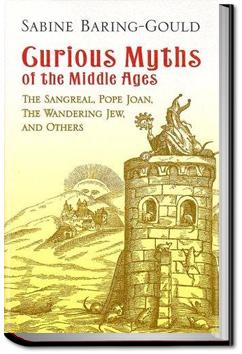UNLIMITED Audiobooks and eBooks
Over 40,000 books & works on all major devices
Get ALL YOU CAN for FREE for 30 days!
Curious Myths of the Middle Ages
Sabine Baring-Gould
Book Overview:
This volume is an example of Sabine Baring-Gould's extensive research into the middle ages. This volume of 12 curiosities was one of Baring-Gould's most successful publications.
This volume is an example of Sabine Baring-Gould's extensive research into the middle ages. This volume of 12 curiosities was one of Baring-Gould's most successful publications.
How does All You Can Books work?
All You Can Books gives you UNLIMITED access to over 40,000 Audiobooks, eBooks, and Foreign Language courses. Download as many audiobooks, ebooks, language audio courses, and language e-workbooks as you want during the FREE trial and it's all yours to keep even if you cancel during the FREE trial. The service works on any major device including computers, smartphones, music players, e-readers, and tablets. You can try the service for FREE for 30 days then it's just $19.99 per month after that. So for the price everyone else charges for just 1 book, we offer you UNLIMITED audio books, e-books and language courses to download and enjoy as you please. No restrictions.
“Excited by the example of his ancestors, who came to worship Christ in his cradle, he had proposed to go to Jerusalem, but had been impeded by the above-mentioned causes.”[19]
At the same time the story crops up in other quarters; so that we cannot look upon Otto as the inventor of the myth. The celebrated Maimonides alludes to it in a passage quoted by Joshua Lorki, a Jewish physician to Benedict XIII. Maimonides lived from 1135 to 1204. The passage is as follows: “It is evident both from the letters of Rambam (Maimonides), whose memory be blessed, and from the narration of merchants who have visited the ends of the earth, that at this time the root of our faith is to be found in the lands of Babel and Teman, where long ago Jerusalem was an exile; no. . . Read More
Try now for FREE!

"Love your service - thanks so much for what you do!"
- Customer Cathryn Mazer
"I did not realize that you would have so many audio books I would enjoy"
- Customer Sharon Morrison
"For all my fellow Audio Book & E-Book regulars:
This is about as close to nirvana as I have found!"
- Twitter post from @bobbyekat



Community Reviews
Baring-Gould collects in one place many of the myths of Medieval England, which are likely uncommon to many contemporary readers, although some remain familiar (i.e. William Tell). Baring-Gould does an excellent job of relating these stories to the extant mythology from many ancient cultures and as
A very interesting book, and well documented.
A thorough investigation of various myths popular during the middle ages. Most of them are still with us today.
Very scholarly, but still fun.
An anthology unlike any other. An investigative approach to European fables of the middle ages, and tracing their origins across time and space, even to places as far away as Persia and India. A must read for anyone interested in a retelling of old myths and legends from an anthropological perspecti
Review originally published on my blog,
Nine Pages
.
In his introduction to this edition, Hardy writes that he “ruthlessly abandoned the farther shores of [Baring-Gould’s] research,” and I am inclined to believe that he was utterly ruthless (14-15). I have sought out copies of Baring-Gould’s unedi
2.5 stars
This was not what I had expected. I had wanted to read a book of myths but this was more like an explanation of the myths. It was an interesting albeit biased bit of information on a few of the more popular folktales.
Seemed to be have a lot of research behind it. However, it was more a history of the myths than simply their telling. Interesting how the medieval myths were such a strange conglomeration of Christian beliefs and pagan superstition.
It's my fault for not paying attention- my dumb ass thought these were literally a selection of Medieval myths. But no. This is a religious (Christian) analysis of said myths.
I tried to read it anyway; but no dice for me.